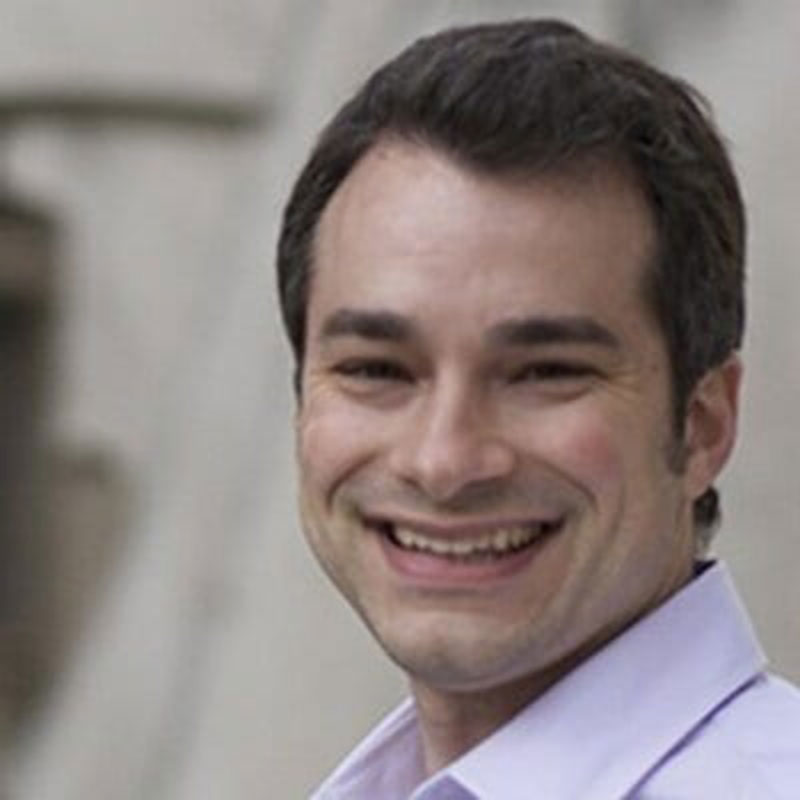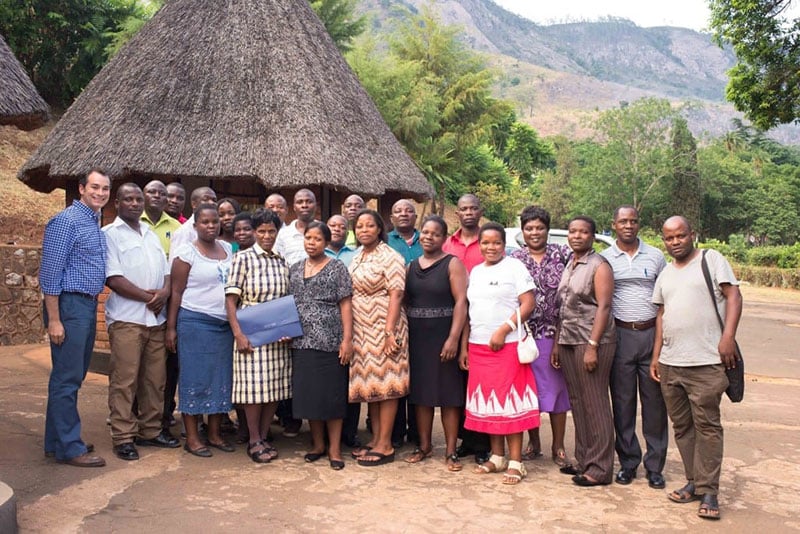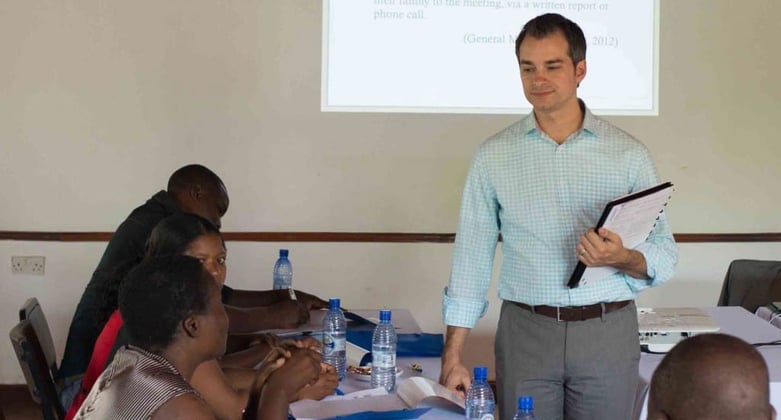
'WE ENTER MEDICINE TO SERVE, NOT JUDGE': Los Angeles pediatrician Dr. Aaron J. Miller is an advocate for educating young patients about safe-sex practices & screening both heterosexual & LGBT teens for violence & emotional abuse. Photo: Courtesy of Dr. Miller"
Ignorance is certainly not bliss in medical education. The Journal of the American Medical Association published a report in 2011 stating that, according to a survey of medical school deans, American medical schools offer an average of just five hours of training in LGBT medicine. What can students at American and Caribbean medical schools do to educate themselves? The best information about LGBT medicine is often available by speaking to leading doctors that regularly treat this community, so UMHS consulted some of the best.
For the second installment of our Doctors and Diversity series on LGBT medicine, the UMHS Pulse spoke to pediatrician Aaron J. Miller, M.D., MPA of the Martin Luther King, Jr. MACC Clinic in Los Angeles, California. Dr. Miller is board-certified in General Pediatrics and in Child Abuse Pediatrics and divides his time between consulting for the Los Angeles County Department of Health Services and growing the nonprofit organization he founded to nurture child health and help survivors of child sexual abuse in Africa, BRANCH (Building Regional Alliances to Nurture Child Health, www.Branchpartners.org)
 At-a-glance
At-a-glance
Free guide
Pediatrics: Is it the right specialty for you?
- Scope of Practice
- Subspecialties
- Salary & Work Statistics
Quick access. No spam. 10 pages.
In addition to his work as a pediatrician, Dr. Miller, who has a Masters in Public Policy and Administration from Columbia University as well as an M.D. from Indiana University School of Medicine, completed 10 years in the Bronx working with police, prosecutors, social workers, psychologists and child protective services to provide evaluation and treatment of children in cases of suspected sexual abuse, physical abuse and neglect.
Academically, Dr. Miller was recently an Assistant Professor of Clinical Pediatrics at Weill Cornell Medical College and has also taught at the Albert Einstein College of Medicine of Yeshiva University. Dr. Miller’s published research includes “the largest study ever of the criminal prosecution of child sexual abuse within a given jurisdiction, and a recent study on the efficacy of a brief teaching intervention on child sexual abuse for physicians in Malawi,” his nonprofit’s website says.
Dr. Miller is also a strong advocate for LGBT medicine, particularly for helping youth struggling with sexuality and the unique medical issues and violence they face. Dr. Miller took time from his busy schedule to speak exclusively with the UMHS Pulse about what medical students should know about treating young LGBT patients from a medical and human perspective.
UMHS Pulse: As a doctor, what is the most important thing to keep in mind when treating an LGBT patient?
Dr. Miller: Violence and emotional abuse are prevalent throughout society, affecting LGBT individuals and heterosexuals, but LGBT patients endure higher rates of this violence and the resulting risk of depression, and a 2 to 3 times higher rate of suicidality. All patients – regardless of sex preferences – should be screened for violence.
How do you handle an LGBT patient who is not “out” to family or coworkers but is sexually active?
Having sex and coming out to family and friends are two totally separate issues. I talk with all patients – LGBT and heterosexual - about safe sex and condoms, including the availability of dental dams to reduce the risk of sexually transmitted infections from oral sex.
What sensitivity issues need to be kept in mind when treating LGBT youth/teens?
LGBT youth are constantly being judged negatively by their family and peers, so it’s important to make sure you show that you are not afraid of them or uncomfortable.

OUTREACH IN AFRICA: In December 2013, Dr. Miller with participants in the Malawi Ministry of Health Training for new one-stop centers for child abuse and domestic violence in Zomba and Mulanje. Photo: www.Branchpartners.org"
You started a nonprofit in Africa, BRANCH, for children that were victims of sexual abuse. What are some of the unique problems LGBT people in Africa face regarding sexuality if they have been abused?
Homosexuality is illegal in Malawi and in several other countries; thus, the stress experienced by LBGT youth is even higher.
Homophobia is a big problem for LGBT people in Africa. What can Americans do to help?
There are numerous nonprofit organizations in African countries that support LGBT youth. Besides donating money to those organizations and those programs, the way that Americans can get involved is to commit spending at least 2 to 3 months, preferably longer,in a given country volunteering for that organization. Many Africans are rightfully skeptical of Americans who think it’s cool or exotic to spend 1 to 2 weeks “saving the world.” Sustained commitment is the only path to acceptance and creating lasting change.
Is it important to educate on the topic of "coming out" and knowing how to guide and advise pediatric patients and their families (as well as adult patients)?
I ask my LGBT patients if they are “out” to their family; if they say no, I let them know there’s no set time or way to come out – it’s a personal decision – and that I would be happy to talk with them if and when they are considering coming out and want advice. Doctors don’t receive training on how to counsel their patients about coming out, which is a shame. My method is just based on my past experiences helping families navigate other sensitive issues. I explore their fears, ask how they think they’d like to come out, and then I give ideas for ways to frame the reasons to their family for why they are coming out.
How should doctors with personal or religious beliefs that are not gay-friendly learn to treat LGBT patients?
We enter the field of medicine to serve, not to judge. We have no idea the journey that people have gone through to walk through that door and open up to us about their lives. Honor that courage. If you come from a background where homosexuality is not accepted, it's normal to not feel comfortable, initially, asking all the health questions. But with time, it becomes easy. Many LGBT patients have been rejected by many people in their lives, so when they see that you are comfortable asking about their lives, they will feel so relieved to know they have you - their doctor - treating them with respect and caring. It’s very heartwarming as a doctor when we see such a strong sense of relief and comfort from a patient, and it motivates me to learn more about how to support them.
What is the proper and most professional way to ask LGBT patients about whether they practice safer sex?
Actually, it’s very important that we not focus too much on sounding “professional.” Being “professional” often comes across as somewhat distant and authoritarian, which makes youth feel judged. We want to be their confidante, so balance your professionalism with the friendliness of a confidante. Make it as easy as possible for someone to give an answer that makes them look bad so that they can feel comfortable opening up about their unsafe sex without feeling judged: (a) use a tone of voice that is nonchalant, (b) and gives multiple choices; for example, “When you have sex, do you use a condom all of the time, or just some of the time, or never?” If they say, “Condoms, every time,” I squint and turn my head with the tone a friend would use and say, “Every time? Maybe once or twice your partner didn’t use condoms?” This doesn’t make them feel like I don’t believe them – it helps to normalize for the patient that it’s difficult to be able and want to use a condom every time.
What constitutes sex? Some people have different ideas about what is actually sex (i.e., oral, anal, vaginal, etc.) Is it necessary to describe the various modes of sex from a medical viewpoint?
Sex means different things to different people (i.e., some think you’re still a virgin if you’ve “only had” anal sex), so yes, I always make sure to ask about different types of sex. After I ask if they have had sex, I ask “Have you had anal sex? Oral sex?” I also ask, “Do you have sex with men, women, or both?” I ask this question at the beginning of the conversation on sex, sometimes as a way for them to help open up to say that they are LGBT.
How should doctors and med students encourage patients to practice safe sex by reviewing potential risks that could be avoided?
When discussing health behaviors with youth, it's less effective to discuss the inherent good or bad aspects of a behavior, or of the possible long-term consequences of a behavior – because youth feel they will live forever. It is will accepted in the Adolescent Health scientific literature that the best way to motivate youth to have a conversation that brings to light how the health behavior could affect their vanity or their goals.It helps to talk about the color and odor of genital discharge from sexually transmitted infections and how some of the infections will stay in your body forever. And I explain how their partner could totally have several STIs but not be having any symptoms, and you may not have any symptoms right now, so you need to be in a long-term relationship where you both get tested before you can feel more comfortable not having protected sex.
Do you recommend testing gay and bisexual men for HIV as well as giving vaccines for hepatitis A and B and meningitis?
The American Academy of Pediatrics recommends offering HIV testing and meningitis vaccine to all youth regardless of sex, gender or orientation. Hepatitis A and B should be given to any youth if they did not receive these as children.
How do you handle the issue of discussing possible alcohol or substance abuse with LGBT patients? When is it necessary to refer an LGBT patient for counseling/rehab?
All youth need to be screened for substance abuse. After taking a full medical and psychosocial history, it’s important to let all youth know how stress can lead to drinking problems.
Do lesbians have any special health needs that should be addressed during office visits?
In one study, lesbians had lower rates of getting preventive services for cancer – like the HPV vaccine – because they were no longer having penile-vaginal sex. But it’s important for all adolescents – boys and girls – to get HPV vaccine.
Most patient information forms now have the option for transgender, next to male or female. When a patient checks transgender, instead of male or female, on a first-time doctor visit form, what is needed to address the patient, treat the patient, and should doctors know good specialists to refer the patient, if needed?
The form should also include a question, “What pronoun do you prefer?” (i.e., he, she). Transgender individuals have higher rates of depression, suicidality and homelessness than their LGB peers. If the patient wants hormone treatment to help change their physical characteristics, then you should know an internist or endocrinologist who you could refer them to.
There is a lot of ignorance about transgender people. What should doctors know about trans people that may not be taught in medical school?
In the same way that homosexuality is not a choice, the gender that you feel you are is not a choice.
Is it important to have reproductive-medicine specialist referrals for LGBT couples interested in having children?
Yes. All caring adults who dream to have a family should be afforded the same help to make that come true.
What about mental health referrals for LGBT patients that may have personal issues or need counseling? What advice do you have for doctors about this area?
As stated before, LGBT youth have 2 to 3 times higher rates of suicide, but all youth – regardless of sex, gender or orientation - need to be screened for mental health issues, and once you find it, you need to make the proper referrals.
(Top photo) DR. MILLER TRAINING IN AFRICA: Dr. Miller in Zomba, Malawi, training medical, legal & social service workers on creating one-stop centers for child abuse and domestic violence. Photo: Timothy Crook.
Video: BRANCH Founder Dr. Aaron J. Miller & Colleagues Discuss One-Step Centre in Malawi, Africa
 At-a-glance
At-a-glance
Free guide
Pediatrics: Is it the right specialty for you?
- Scope of Practice
- Subspecialties
- Salary & Work Statistics
Quick access. No spam. 10 pages.

Scott is Director of Digital Content & Alumni Communications Liaison at UMHS and editor of the UMHS Endeavour blog. When he's not writing about UMHS students, faculty, events, public health, alumni and UMHS research, he writes and edits Broadway theater reviews for a website he publishes in New York City, StageZine.com.

















